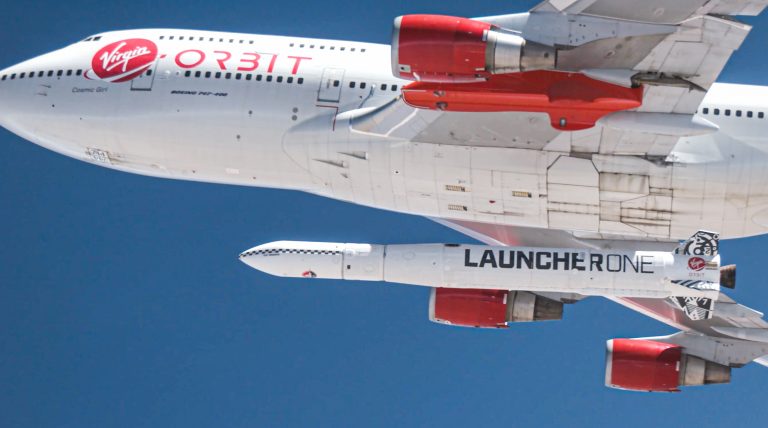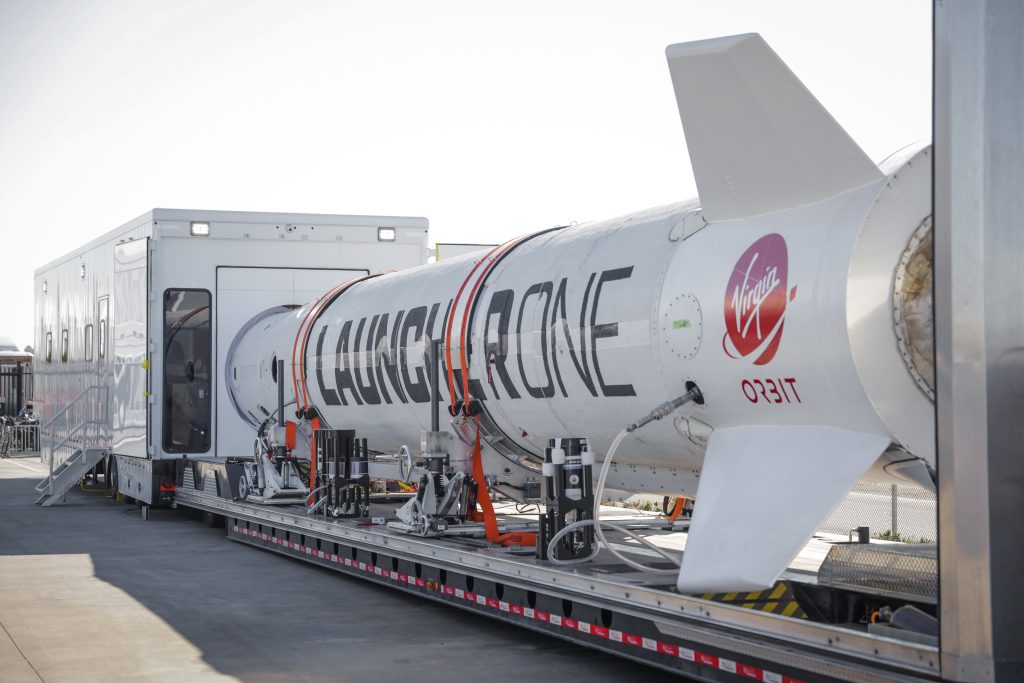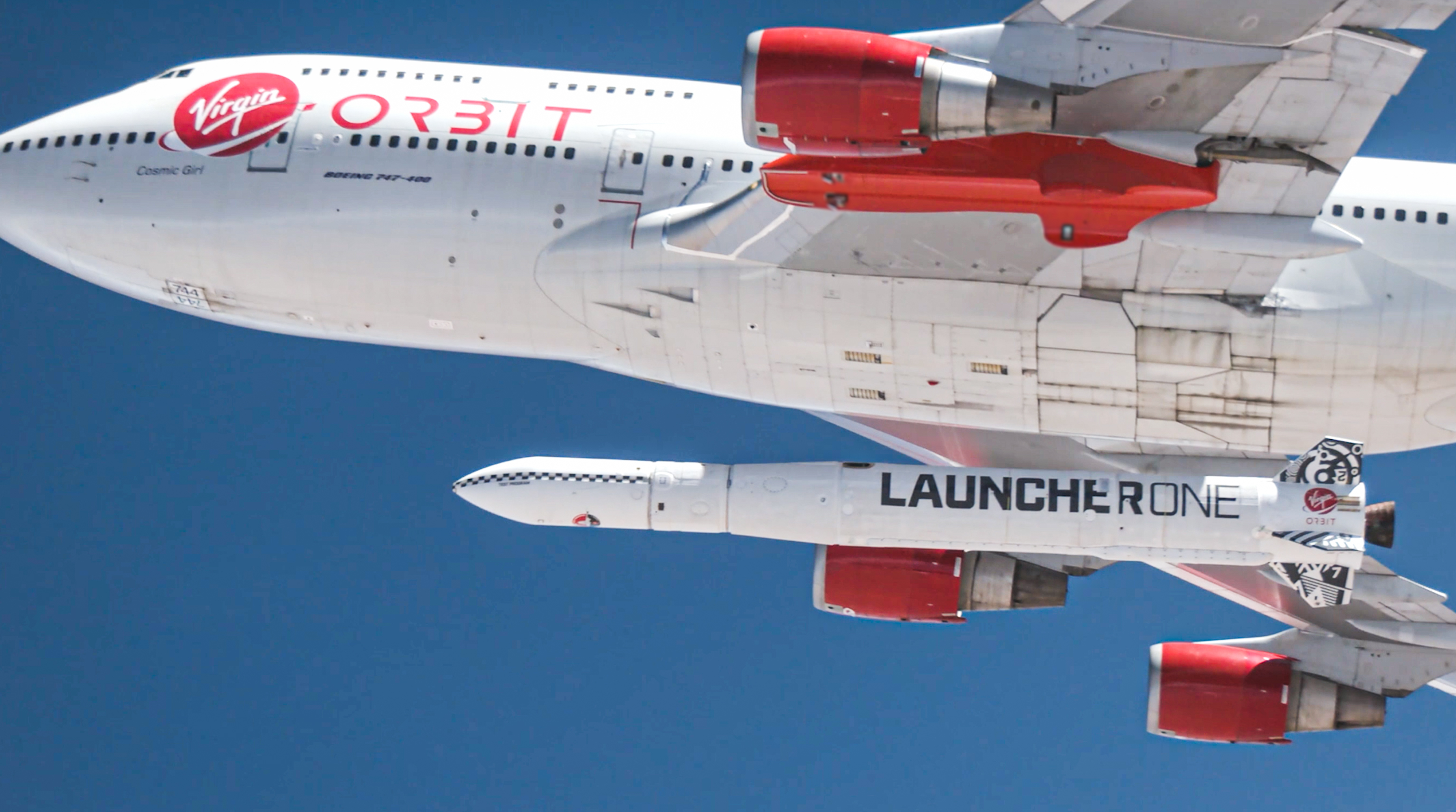Spaceport Cornwall to host UK's first satellite launch this summer
Spaceport Cornwall to host UK’s first satellite launch this summer
The UK Government has announced the first UK satellite launch, to take place this summer, with “Prometheus-2” taking off from Spaceport Cornwall, in Newquay.
Spaceport Cornwall to host UK's first satellite launch this summer
The Defence Procurement Minister, Jeremy Quin, has announced two Cubesats will be carried on Virgin Orbit’s Launcher One rocket (pictured), taking off horizontally from a modified Boeing 747 jet, named Cosmic Girl. The mission will enable the UK Ministry of Defence (MOD) to identify new techniques and algorithms for operating satellites and data processing.
“We are putting the UK at the forefront of small satellite launch, providing world-leading capability for commercial customers and governments within a global market, opening new opportunities and inspiring the current and next generation of British space scientists, engineers and entrepreneurs,” said Deputy CEO at the UK Space Agency, Ian Annett. These satellites showcase the UK’s strengths in designing and building satellites. Being able to launch from the UK and across Europe for the first time will boost our satellite industry further, create high skilled jobs across the country and deliver a key ambition of the National Space Strategy.”Spaceport Cornwall to host UK's first satellite launch this summer
The Defence Procurement Minister, Jeremy Quin, has announced two Cubesats will be carried on Virgin Orbit’s Launcher One rocket (pictured), taking off horizontally from a modified Boeing 747 jet, named Cosmic Girl. The mission will enable the UK Ministry of Defence (MOD) to identify new techniques and algorithms for operating satellites and data processing.
“We are putting the UK at the forefront of small satellite launch, providing world-leading capability for commercial customers and governments within a global market, opening new opportunities and inspiring the current and next generation of British space scientists, engineers and entrepreneurs,” said Deputy CEO at the UK Space Agency, Ian Annett. These satellites showcase the UK’s strengths in designing and building satellites. Being able to launch from the UK and across Europe for the first time will boost our satellite industry further, create high skilled jobs across the country and deliver a key ambition of the National Space Strategy.”Prometheus-2
Built by In-Space Missions, which is based in Hampshire, and designed with Airbus Defence and Space, Prometheus-2 is described as a collaboration between the MOD and international partners, including the US National Reconnaissance Office (NRO).
The two shoebox-sized satellites will provide a test platform for monitoring radio signals including GPS and sophisticated imaging, paving the way for a more collaborative and connected space communication system with our allies.
“This is a great example of the power of international collaboration – a key tenet of our Defence Space Strategy,” said Director Space at MOD, Air Vice Marshal Harv Smyth. “Prometheus 2 will deliver immense value to the UK MOD’s future space programme and, thanks to our partners in the National Reconnaissance Office, this highly-capable satellite will launch from UK soil this summer. I am hugely proud of what we have achieved together and this is just the beginning.”No exact launch date has yet been announced.
CubesatsThe Cubesats will operate in low Earth Orbit, around 550km above the Earth and 50-100km apart at 17,000mph.
Cubesat 1 includes a hyperspectral imager, a laser detector and a GPS receiver. The hyperspectral imager will capture multiple slivers of pictures over different wavelengths of light for higher definition images. The GPS receiver confirms the precise time and position of the satellite over the area of the Earth to be photographed.
Cubesat 2 includes two optical imaging cameras, a laser range finder, and a GPS receiver. One camera will be fitted with a wide-angle lens for a 180-degree view of Earth’s surface with the second camera observing the other Cubesat 1 to support space situational awareness and enables us to understand what else orbits the Earth.
The plan is to “test novel concepts as a pathfinder” in support of the Minerva constellation for space-based intelligence and surveillance, this will be via the UK’s Defence Science and Technology Laboratory (Dstl) Hermes ground-station based in Portsmouth.
“The Prometheus-2 mission, with the first ever directly owned Dstl satellites, exemplifies the decades-long collaborative relationship with our international allies, and shows how we can best partner with industry, said Dstl’s Chief Executive, Paul Hollinshead. “It will achieve critical R&D outcomes and help increase our pool of qualified space personnel to help grow the UK’s capability to deliver space systems in the future.”UK horizontal launches
Cornwall is not the only UK site looking to support such horizontal launches, as provided by Virgin Orbit. We reported recently on Prestwick Spaceport’s progress towards horizontal launches in 2023, for smaller satellites such as CubeSats.
For these launches the payload is launched by rocket mid-air from an aircraft – at a suitable altitude over a body of water – which in turn means traditional airport infrastructure can be used. The launches are also less vulnerable to adverse conditions.



There are no comments yet.